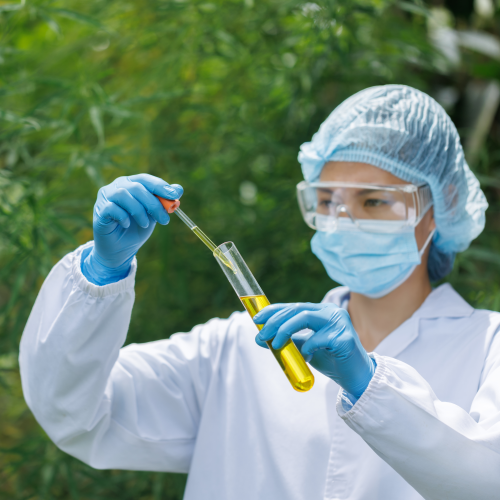
Organic and 'clean' growing methods have exploded in popularity among large scale greenhouse operations and home growers alike. Due to the current federal status of cannabis, official organic certification is still a way off. Consumers are actively seeking out healthier options among cannabinoid products, and growers can sometimes feel lost in the sea of information about what it means to grow cleanly. Third-party certifications have been developed that help to uphold a quality standard among clean growers, such as through the Clean Green Certified Program, DOH Compliance, and testing through Confident Cannabis. Though the process of obtaining these licenses and approvals can seem daunting for some growers, it’s easy to incorporate the benefits clean growing can offer. Home growers can even improve the health and quality of their plants without needing to scrap their current grow.

It’s no secret that organic produce is colorful and delicious, but what’s the real difference when you're talking about hemp or cannabis? Plants need a diverse selection of macro and micronutrients that are present in healthy soil. Though most conventional fertilizers focus on Nitrogen, Phosphorus, and Potassium, there are other nutrients that plants need to take in the complete spectrum of nutrients. Growing with organic inputs, such as Purple Cow Organics products, provides a diverse range of minerals and nutrients to your plants that are naturally derived and can fill deficiencies that you didn’t even know your plants had! In the case of commercial hemp production, working with biologically focused inputs can actually increase the overall quality and quantity of crop that your plants produce by making nutrients more readily available in your soil.

When you follow organic processes, whether you grow organically or conventionally, you can positively impact the way that your soil processes nutrients. Healthy soil does more than grow better plants, it can also improve the health of the planet. This is especially important when growing in fields or in-ground beds. On a larger scale, healthy soil that has a rich population of microbial life can hold up to 18-20 times its weight in water, helping to prevent flooding and erosion. Healthy soil also supports healthy plants, which can pull large amounts of carbon out of the atmosphere and sequester it in the soil. On a smaller scale, using natural inputs decreases the number of synthetic fertilizers and pesticides that can end up in waterways, helping to support fresh, clean water. Even backyard growers can contribute to a healthier planet by reducing the number of synthetic fertilizers that eventually runoff into waterways. Organic fertilizers and amendments work with nature because they come from nature, allowing you to give to your soil while it gives back to you.

Organic horticulture pulls the focus away from adding fertilizer to your plants and works towards adding what your soil needs. Plants require a diverse collection of minerals from different sources. When you add conventional fertilizers you often only target the 'N-P-K' content, and don't replace micronutrients or biology. Soil that’s lost its vitality is hard to grow in and can take upwards of a decade to recover. When growing in trays or raised bed containers, it can mean completely replacing your growing media, which becomes expensive over time. Adding nutrients AND biology and allows those inputs to be cycled and held in the soil, rather than washing out. Diverse biology is important to that process because the more species of beneficial bacteria and fungi that are present in your soil, the more nutrients are available to your plants, which can be held in the soil until needed.
So, how do we do it? There’s more to adopting clean growing practices than starting over from scratch. Many growers who are looking to use natural inputs, might rely on conventional methods or inputs due to the nature of their operation. The common denominator to growing better produce, whether conventional or organic, is biology. Organic growing in large-scale agriculture involves knowing what your soil needs, and growing with what your ecosystem can sustain. Many clean cannabis growers work with companion crops, such as clover, to fix nutrients in the soil and support a healthier growing system. At the same time, growers are utilizing inputs that support the microbiology in your soil's ecosystem. Working with biology is a natural way to help your plants develop stronger root systems, increase their vitality, and can even allow you to use less inputs on your crops.
There are different ways you can introduce biology into your growing system. Growing in a living soil media, such as Crafter's Mix or IndiCanja, is an easy way to start out on the right foot. Living soil medias are formulated with nutrients to support the microbial life in your growing media, feeding your plants and the beneficial bacteria they rely on.
You can also supplement your soil or existing nutrient program with Purple Cow CX-1. Purple Cow CX-1 is a broad-spectrum liquid biological that provides a concentrated dose of diverse biological species, perfect for rebuilding the life in your soil. We recommend feeding the biology in Purple Cow CX-1 with our BioActive Vegetable Supercharger, a complex of kelp and humates that is immediately available to your plants at the root and upon the leaf surface.
There are many routes to cleaner growing, from licenses and certifications for the quality of your crop, to giving your soil some biological support for a healthier harvest. Whatever your end-goal, and however large your operation,
Looking for more information on living soil mixes, CX-1, or how to grow cleanly? Contact us here!


